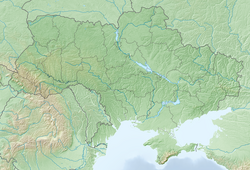Neskuchne, Donetsk Oblast
Neskuchne
Нескучне | |
|---|---|
Village | |
 House-Museum of Vladimir Nemirovich-Danchenko | |
| Coordinates: 47°49′12″N 36°48′32″E / 47.82000°N 36.80889°E | |
| County | |
| Oblast | Donetsk |
| Raion | Volnovakha |
| Hromada | Velyka Novosilka |
| Population (2016) | |
• Total | 644 |
| Time zone | UTC+2 |
| • Summer (DST) | UTC+3 (EEST) |
| Postal code | 85500 |
| Area code | +380 6243 |
Neskuchne (Ukrainian: Нескучне) is a village (selo) in Volnovakha Raion, Donetsk Oblast, Ukraine, on the western, left bank of the Mokri Yaly river. It is just south of the larger town of Velyka Novosilka and north of the village of Storozheve. It belongs to the Velyka Novosilka settlement hromada, one of the hromadas of Ukraine.
History
The early 20th century manor house of Russian playwright Vladimir Nemirovich-Danchenko is in Neskuchne.[citation needed]
As a result of the Russian invasion of Ukraine, Neskuchne was occupied by the Russian Federation.[1] Russian forces accidentally shelled their own positions near the village on 8 July 2022.[2] According to Russian milbloggers, Ukraine recaptured the village on 4 June 2023 and [3] on June 10, it was reported to be liberated by the 7th Battalion Arei of the Ukrainian Volunteer Army of the 129th Kryvyi Rih Defense Brigade of the Territorial Defense Forces.[4]
Since March 2023, the battalion had been preparing for recapture of the village. It had become an outpost of the Russian occupying forces, with a complex geography: a hill on one side, and the Mokri Yaly river on the other. On a hill below the river there was a school in which a Russian fortified point was located. The village had been under the occupation for more than a year and there were several attempts to retake it.
On the morning of June 7, the storming of the village began and on June 11, 2023, the village was liberated. During the assault, 6 soldiers of the battalion died.[5]
Demographics
According to the 2001 Census, the village has a population of 733. 85.95% of residents were native Ukrainian speakers, 13.78% were native Russian speakers, and the remaining 0.14% were either native Gagauz or Greek speakers.[6]
See also
References
- ^ "Interactive Map: Russia's Invasion of Ukraine". ArcGIS StoryMaps. ISW. 6 April 2023. Retrieved 6 April 2023.
- ^ "Самоліквідувалися: російські війська вдарили по своїх позиціях – Запорізька ОВА". Українська правда (in Ukrainian). Retrieved 6 April 2023.
- ^ "Russian Offensive Campaign Assessment, June 4, 2023". Institute for the Study of War. 4 June 2023. Retrieved 5 June 2023.
- ^ "Сили оборони звільнили ще одне село на Донеччині". Українська правда (in Ukrainian). Retrieved 16 August 2023.
- ^ "Шість побратимів загинули. Подробиці неочікуваного для окупантів штурму Нескучного, який закінчився звільненням села — інтерв'ю з бійцем". New Voice (in Ukrainian). Retrieved 16 August 2023.
- ^ "Офіційна сторінка Всеукраїнського перепису населення | Банк даних" [All-Ukrainian population census | Database]. ukrcensus.gov.ua (in Ukrainian). Retrieved 15 June 2023.


